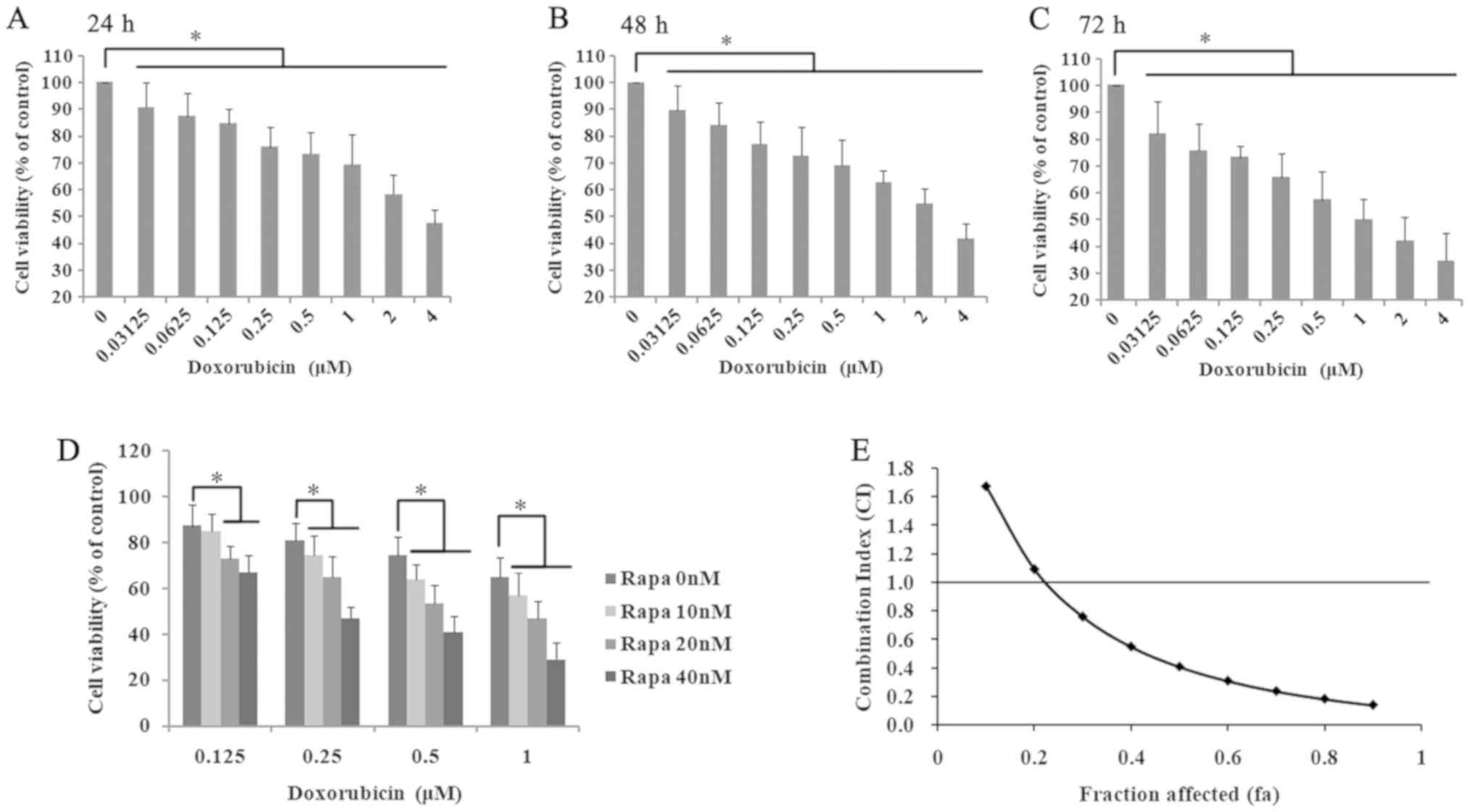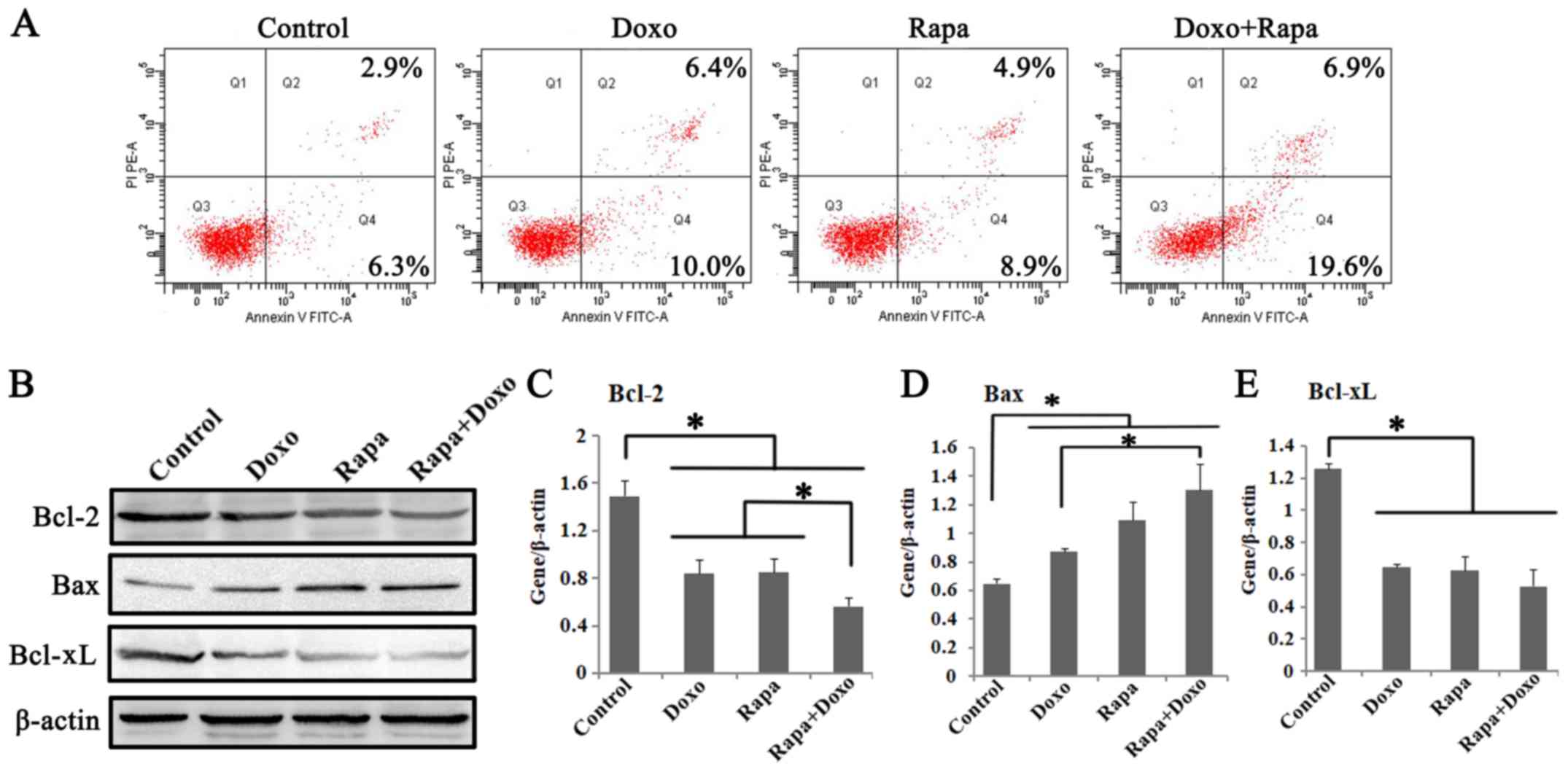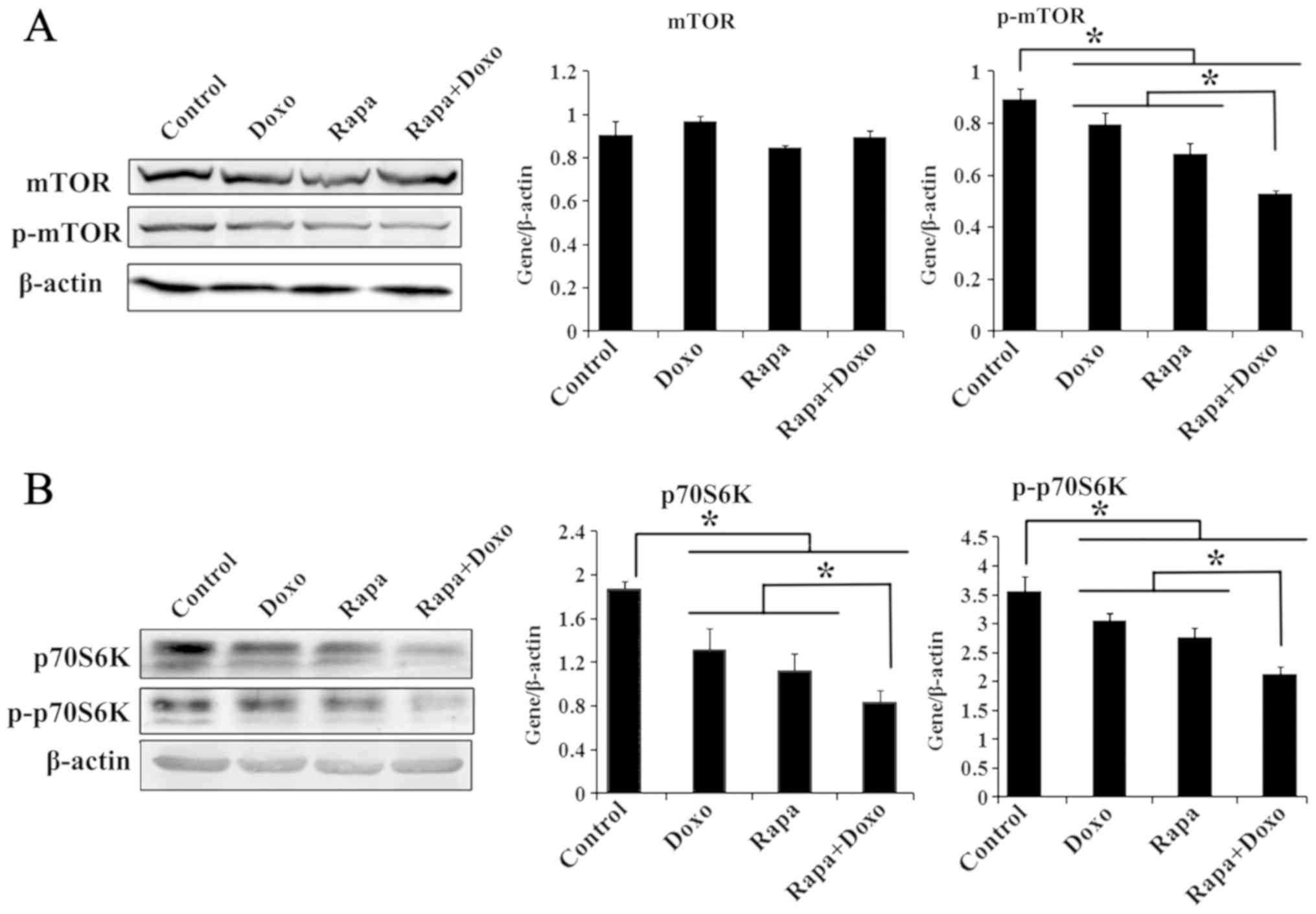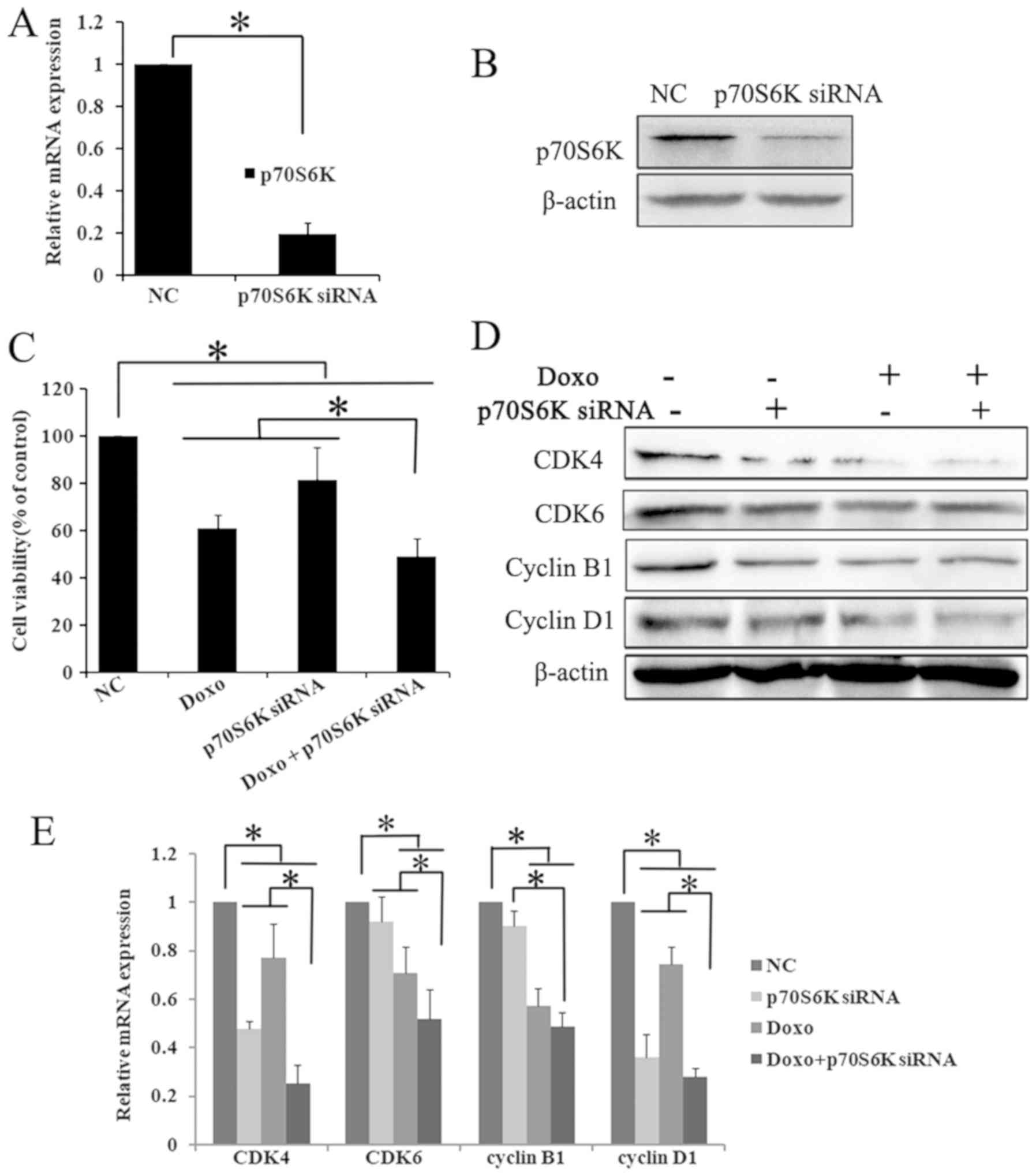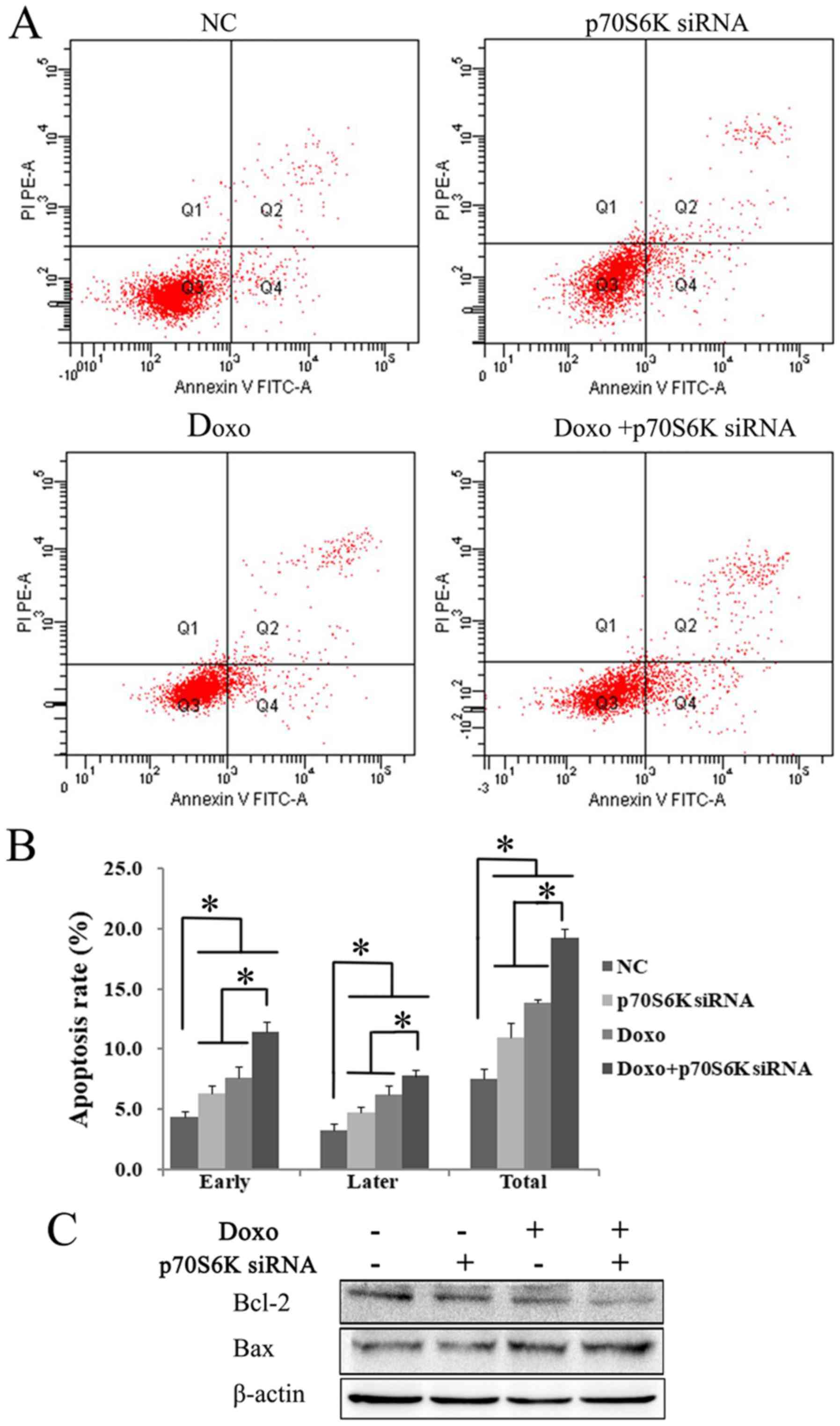|
1
|
Rowley JD: Ph1-positive leukaemia,
including chronic myelogenous leukaemia. Clin Haematol. 9:55–86.
1980.PubMed/NCBI
|
|
2
|
Groffen J, Stephenson JR, Heisterkamp N,
de Klein A, Bartram CR and Grosveld G: Philadelphia chromosomal
breakpoints are clustered within a limited region, bcr, on
chromosome 22. Cell. 36:93–98. 1984. View Article : Google Scholar : PubMed/NCBI
|
|
3
|
Gorre ME, Mohammed M, Ellwood K, Hsu N,
Paquette R, Rao PN and Sawyers CL: Clinical resistance to STI-571
cancer therapy caused by BCR-ABL gene mutation or amplification.
Science. 293:876–880. 2001. View Article : Google Scholar : PubMed/NCBI
|
|
4
|
Okabe S, Tauchi T, Tanaka Y, Kitahara T,
Kimura S, Maekawa T and Ohyashiki K: Efficacy of the dual PI3K and
mTOR inhibitor NVP-BEZ235 in combination with nilotinib against
BCR-ABL-positive leukemia cells involves the ABL kinase domain
mutation. Cancer Biol Ther. 15:207–215. 2014. View Article : Google Scholar : PubMed/NCBI
|
|
5
|
Sun Z, Li Q, Zhang S, Chen J, Huang L, Ren
J, Chang Y, Liang Y and Wu G: NVP-BEZ235 overcomes
gefitinib-acquired resistance by down-regulating PI3K/AKT/mTOR
phosphorylation. Onco Targets Ther. 8:269–277. 2015.PubMed/NCBI
|
|
6
|
Xu J, Pham CG, Albanese SK, Dong Y, Oyama
T, Lee CH, Rodrik-Outmezguine V, Yao Z, Han S, Chen D, et al:
Mechanistically distinct cancer-associated mTOR activation clusters
predict sensitivity to rapamycin. J Clin Invest. 126:3526–3540.
2016. View
Article : Google Scholar : PubMed/NCBI
|
|
7
|
Morran DC, Wu J, Jamieson NB, Mrowinska A,
Kalna G, Karim SA, Au AY, Scarlett CJ, Chang DK, Pajak MZ, et al:
Targeting mTOR dependency in pancreatic cancer. Gut. 63:1481–1489.
2014. View Article : Google Scholar : PubMed/NCBI
|
|
8
|
Mohi MG, Boulton C, Gu TL, Sternberg DW,
Neuberg D, Griffin JD, Gilliland DG and Neel BG: Combination of
rapamycin and protein tyrosine kinase (PTK) inhibitors for the
treatment of leukemias caused by oncogenic PTKs. Proc Natl Acad Sci
USA. 101:3130–3135. 2004. View Article : Google Scholar : PubMed/NCBI
|
|
9
|
Parmar S, Smith J, Sassano A, Uddin S,
Katsoulidis E, Majchrzak B, Kambhampati S, Eklund EA, Tallman MS,
Fish EN and Platanias LC: Differential regulation of the p70 S6
kinase pathway by interferon alpha (IFNalpha) and imatinib mesylate
(STI571) in chronic myelogenous leukemia cells. Blood.
106:2436–2443. 2005. View Article : Google Scholar : PubMed/NCBI
|
|
10
|
Hirase C, Maeda Y, Takai S and Kanamaru A:
Hypersensitivity of Ph-positive lymphoid cell lines to rapamycin:
Possible clinical application of mTOR inhibitor. Leuk Res.
33:450–459. 2009. View Article : Google Scholar : PubMed/NCBI
|
|
11
|
Batista A, Barata JT, Raderschall E,
Sallan SE, Carlesson N, Nadler LM and Cardoso AA: Targeting of
active mTOR inhibits primary leukemia T cells and synergizes with
cytotoxic drugs and signaling inhibitors. Exp Hematol.
39:457–472.e3. 2011. View Article : Google Scholar : PubMed/NCBI
|
|
12
|
Li J, Xue L, Hao H, Han Y, Yang J and Luo
J: Rapamycin provides a therapeutic option through inhibition of
mTOR signaling in chronic myelogenous leukemia. Oncol Rep.
27:461–466. 2012.PubMed/NCBI
|
|
13
|
LoPiccolo J, Blumenthal GM, Bernstein WB
and Dennis PA: Targeting the PI3K/Akt/mTOR pathway: Effective
combinations and clinical considerations. Drug Resist Updat.
11:32–50. 2008. View Article : Google Scholar : PubMed/NCBI
|
|
14
|
Guo N, Azadniv M, Coppage M, Nemer M,
Mendler J, Becker M and Liesveld J: Effects of neddylation and mTOR
inhibition in acute myelogenous leukemia. Transl Oncol. 12:602–613.
2019. View Article : Google Scholar : PubMed/NCBI
|
|
15
|
Ly C, Arechiga AF, Melo JV, Walsh CM and
Ong ST: Bcr-Abl kinase modulates the translation regulators
ribosomal protein S6 and 4E-BP1 in chronic myelogenous leukemia
cells via the mammalian target of rapamycin. Cancer Res.
63:5716–5722. 2003.PubMed/NCBI
|
|
16
|
Xin P, Li C, Zheng Y, Peng Q, Xiao H,
Huang Y and Zhu X: Efficacy of the dual PI3K and mTOR inhibitor
NVP-BEZ235 in combination with imatinib mesylate against chronic
myelogenous leukemia cell lines. Drug Des Devel Ther. 11:1115–1126.
2017. View Article : Google Scholar : PubMed/NCBI
|
|
17
|
Li J, Xue L, Hao H, Li R and Luo J:
Rapamycin combined with celecoxib enhanced antitumor effects of
mono treatment on chronic myelogenous leukemia cells through
downregulating mTOR pathway. Tumour Biol. 35:6467–6474. 2014.
View Article : Google Scholar : PubMed/NCBI
|
|
18
|
Harada H, Andersen JS, Mann M, Terada N
and Korsmeyer SJ: p70S6 kinase signals cell survival as well as
growth, inactivating the pro-apoptotic molecule BAD. Proc Natl Acad
Sci USA. 98:9666–9670. 2001. View Article : Google Scholar : PubMed/NCBI
|
|
19
|
Xie Y, Naizabekov S, Chen Z and Tokay T:
Power of PTEN/AKT: Molecular switch between tumor suppressors and
oncogenes. Oncol Lett. 12:375–378. 2016. View Article : Google Scholar : PubMed/NCBI
|
|
20
|
Vicary GW and Roman J: Targeting the
mammalian target of rapamycin in lung cancer. Am J Med Sci.
352:507–516. 2016. View Article : Google Scholar : PubMed/NCBI
|
|
21
|
Kurgan N, Tsakiridis E, Kouvelioti R,
Moore J, Klentrou P and Tsiani E: Inhibition of human lung cancer
cell proliferation and survival by post-exercise serum is
associated with the inhibition of Akt, mTOR, p70 S6K, and Erk1/2.
Cancers (Basel). 9:E462017. View Article : Google Scholar : PubMed/NCBI
|
|
22
|
Wiesweg M, Reis H, Köster T, Goetz M, Worm
K, Herold T, Paul A, Dechêne A, Schumacher B, Markus P, et al:
Phosphorylation of p70 ribosomal protein S6 kinase β-1 is an
independent prognostic parameter in metastatic colorectal cancer.
Clin Colorectal Cancer. 17:e331–e352. 2018. View Article : Google Scholar : PubMed/NCBI
|
|
23
|
Morjani H, Pignon B, Millot JM, Debal V,
Lamiable D, Potron G, Etienne JC and Manfait M: Intranuclear
concentration measurements of doxorubicin in living leucocytes from
patients treated for a lympho-proliferative disorder. Leuk Res.
16:647–653. 1992. View Article : Google Scholar : PubMed/NCBI
|
|
24
|
Speth PA, Linssen PC, Termond EF, Boezeman
JB, Wessels HM and Haanen C: In vivo and in vitro pharmacokinetic
differences between four structurally closely related
anthracyclines in hematopoietic cell subtypes in humans. Drug Metab
Dispos. 17:98–105. 1989.PubMed/NCBI
|
|
25
|
Skorkina MY, Shamray EA, Salo VA,
Buchelnikov AS and Evstigneev MP: Study of the properties of
doxorubicin-resistant cells affected by acute leucosis. J Bioenerg
Biomembr. 50:53–58. 2018. View Article : Google Scholar : PubMed/NCBI
|
|
26
|
Chekin F, Myshin V, Ye R, Melinte S, Singh
SK, Kurungot S, Boukherroub R and Szunerits S: Graphene-modified
electrodes for sensing doxorubicin hydrochloride in human plasma.
Anal Bioanal Chem. 411:1509–1516. 2019. View Article : Google Scholar : PubMed/NCBI
|
|
27
|
Jin ZJ: Addition in drug combination
(author's transl). Zhongguo Yao Li Xue Bao. 1:70–76. 1980.(In
Chinese). PubMed/NCBI
|
|
28
|
Ding Y, Niu W, Zhang T, Wang J, Cao J,
Chen H, Wang R and An H: Levistolide A synergistically enhances
doxorubicin-induced apoptosis of k562/dox cells by decreasing MDR1
expression through the ubiquitin pathway. Oncol Rep. 41:1198–1208.
2019.PubMed/NCBI
|
|
29
|
Livak KJ and Schmittgen TD: Analysis of
relative gene expression data using real-time quantitative PCR and
the 2(-Delta Delta C(T)) method. Methods. 25:402–408. 2001.
View Article : Google Scholar : PubMed/NCBI
|
|
30
|
Chou TC: Theoretical basis, experimental
design, and computerized simulation of synergism and antagonism in
drug combination studies. Pharmacol Rev. 58:621–681. 2006.
View Article : Google Scholar : PubMed/NCBI
|
|
31
|
Yuan HX and Guan KL: The SIN1-PH domain
connects mTORC2 to PI3K. Cancer Discov. 5:1127–1129. 2015.
View Article : Google Scholar : PubMed/NCBI
|
|
32
|
MondesireW H, Jian W, Zhang H, Ensor J,
Hung MC, Mills GB and Meric-Bernstam F: Targeting mammalian target
of rapamycin synergistically enhances chemotherapy-induced
cytotoxicity in breast cancer cells. Clin Cancer Res. 10:7031–7042.
2004. View Article : Google Scholar : PubMed/NCBI
|
|
33
|
Shen YQ, Guerra-Librero A, Fernandez-Gil
BI, Florido J, García-López S, Martinez-Ruiz L, Mendivil-Perez M,
Soto-Mercado V, Acuña-Castroviejo D, Ortega-Arellano H, et al:
Combination of melatonin and rapamycin for head and neck cancer
therapy: Suppression of AKT/mTOR pathway activation, and activation
of mitophagy and apoptosis via mitochondrial function regulation. J
Pineal Res. 64:2018. View Article : Google Scholar : PubMed/NCBI
|
|
34
|
Hsu PY, Wu VS, Kanaya N, Petrossian K, Hsu
HK, Nguyen D, Schmolze D, Kai M, Liu CY, Lu H, et al: Dual mTOR
kinase inhibitor MLN0128 sensitizes HR+/HER2+
breast cancer patient-derived xenografts to trastuzumab or
fulvestrant. Clin Cancer Res. 24:395–406. 2018. View Article : Google Scholar : PubMed/NCBI
|
|
35
|
Zheng JH, Viacava Follis A, Kriwacki RW
and Moldoveanu T: Discoveries and controversies in BCL-2
protein-mediated apoptosis. FEBS J. 283:2690–2700. 2016. View Article : Google Scholar : PubMed/NCBI
|
|
36
|
Ma XM and Blenis J: Molecular mechanisms
of mTOR-mediated translational control. Nat Rev Mol Cell Biol.
10:307–318. 2009. View Article : Google Scholar : PubMed/NCBI
|
|
37
|
Bian CX, Shi Z, Meng Q, Jiang Y, Liu LZ
and Jiang BH: P70S6K 1 regulation of angiogenesis through VEGF and
HIF-1alpha expression. Biochem Biophys Res Commun. 398:395–399.
2010. View Article : Google Scholar : PubMed/NCBI
|
|
38
|
Yamnik RL, Digilova A, Davis DC, Brodt ZN,
Murphy CJ and Holz MK: S6 kinase 1 regulates estrogen receptor
alpha in control of breast cancer cell proliferation. J Biol Chem.
284:6361–6369. 2009. View Article : Google Scholar : PubMed/NCBI
|
|
39
|
Qiu ZX, Sun RF, Mo XM and Li WM: The
p70S6K specific inhibitor PF-4708671 impedes non-small cell lung
cancer growth. PLoS One. 11:e01471852016. View Article : Google Scholar : PubMed/NCBI
|
|
40
|
Baba HA, Wohlschlaeger J, Cicinnati VR,
Hilgard P, Lang H, Sotiropoulos GC, Takeda A, Beckebaum S and
Schmitz KJ: Phosphorylation of p70S6 kinase predicts overall
survival in patients with clear margin-resected hepatocellular
carcinoma. Liver Int. 29:399–405. 2009. View Article : Google Scholar : PubMed/NCBI
|
|
41
|
Li SH, Chen CH, Lu HI, Huang WT, Tien WY,
Lan YC, Lee CC, Chen YH, Huang HY, Chang AY and Lin WC:
Phosphorylated p70S6K expression is an independent prognosticator
for patients with esophageal squamous cell carcinoma. Surgery.
157:570–580. 2015. View Article : Google Scholar : PubMed/NCBI
|
|
42
|
No JH, Jeon YT, Park IA, Kim YB, Kim JW,
Park NH, Kang SB, Han JY, Lim JM and Song YS: Activation of mTOR
signaling pathway associated with adverse prognostic factors of
epithelial ovarian cancer. Gynecol Oncol. 121:8–12. 2011.
View Article : Google Scholar : PubMed/NCBI
|
|
43
|
Yoshida S, Matsumoto K, Arao T, Taniguchi
H, Goto I, Hanafusa T, Nishio K and Yamada Y: Gene amplification of
ribosomal protein S6 kinase-1 and −2 in gastric cancer. Anticancer
Res. 33:469–475. 2013.PubMed/NCBI
|
|
44
|
Grasso S, Tristante E, Saceda M, Carbonell
P, Mayor-López L, Carballo-Santana M, Carrasco-García E,
Rocamora-Reverte L, García-Morales P, Carballo F, et al: Resistance
to Selumetinib (AZD6244) in colorectal cancer cell lines is
mediated by p70S6K and RPS6 activation. Neoplasia. 16:845–860.
2014. View Article : Google Scholar : PubMed/NCBI
|
|
45
|
Xu X, Sun J, Song R, Doscas ME, Williamson
AJ, Zhou J, Sun J, Jiao X, Liu X and Li Y: Inhibition of p70 S6
kinase (S6K1) activity by A77 1726, the active metabolite of
leflunomide, induces autophagy through TAK1-mediated AMPK and JNK
activation. Oncotarget. 8:30438–30454. 2017.PubMed/NCBI
|
|
46
|
Ji ZP, Qiang L and Zhang JL: Transcription
activated p73-modulated cyclin D1 expression leads to doxorubicin
resistance in gastric cancer. Exp Ther Med. 15:1831–1838.
2018.PubMed/NCBI
|
|
47
|
Gogolin S, Ehemann V, Becker G, Brueckner
LM, Dreidax D, Bannert S, Nolte I, Savelyeva L, Bell E and
Westermann F: CDK4 inhibition restores G(1)-S arrest in
MYCN-amplified neuroblastoma cells in the context of
doxorubicin-induced DNA damage. Cell Cycle. 12:1091–1104. 2013.
View Article : Google Scholar : PubMed/NCBI
|















